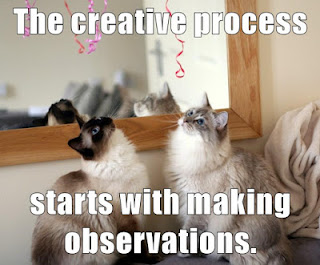Growth Mindset
I had not previously heard of Carol Dweck or the Growth Mindset. This lesson was completely new to me. I'm not sure where I would fit into it personally. I like to learn new things and I like a challenge so I guess I would fit into that. But also I'm 46 years old and was taught more old-school than what education is today. I always got straight A's in school and until high school and college, most everything came easy to me. It's not that the material wasn't challenging, plenty of classmates struggled, but I just always had an ability to pick up new things. I really liked being in the gifted program because there were new lessons and different things we could learn and also they were more challenging. I started having to work at it more in high school and college simply because there were more demands on my time and brain and also more stress.
I don't think I completely agree with Dweck that we can simply just praise the effort. To me it feels like participation trophies (mentioned in Kohn's article) which I definitely don't agree with. In life there are winners and losers, it's just that simple. You can try your best and put in all the effort you want, but there is always someone else out there putting in the effort too and maybe that day they are better than you. I also think that some people have more natural talents than others and some things are just going to come easier to them. My oldest daughter is tall and had the most beautiful natural shot with a basketball. Middle school teams were drooling over her. However she was not athletic at all and could NOT run. Yes, she could have worked on the other skills necessary and probably become a very good basketball player, but to her it wasn't worth the effort because there were other things that she had more interest in that were worth her effort. I am gifted with numbers, but in relation to business and accounting, not in advanced math. You can praise my effort all you want, but it's not going to improve my ability to do calculus. Give me a box of receipts and tax information though, and I can make that puzzle make sense in no time flat because to me there's a practical goal to work toward. I also learn better if I have to teach something to someone else instead of just read something and spit back answers on exams.
I think in some things we have to have definite guidelines for grades. In science and math, if you don't get the right answer, how can you grade the effort because you are working for something exact. To get an A, it requires right answers. I keep putting off Business Calculus because I know it's going to be a struggle. In no circumstance do I expect them to pass me just because I put in effort. In a language class, if you can't speak it correctly, meaning no one else can understand you, how do you expect to get a passing grade? In my programming classes, if the program doesn't run and give the desired result, I'm not getting full credit for the assignment and in real life I could lose my job or not get paid for the project for failing to produce the required results.
I do understand that some kids do need the effort and struggle rewarded, but they also need to understand that in life, you have to produce results. Even if you only work at McDonald's, if I order a meal and you only give me the fries and drink, I'm going to be unhappy. Do it several times and you're going to get fired because bosses don't want to hear "well I was trying really hard and I remembered two of the three items." I can see the benefit if you are rewarding the effort for a time period until the child catches on but at some time, we have to set expectations for them that meeting certain standards are required for certain grades. If you have a child that's ok with only C's, then so be it, but don't reward them with A's just because they tried but only produced C work. How is that fair to the kids that put in the A work?
What I have learned during my time at OU is how to survive. I have health issues, a family, and I work full-time. I want straight A's because my whole life I have been an A student and I'm fully capable of them. However, I know that my brain and body have a lot of drains on them other than just my course work so I have had to learn to lower my expectations a bit and not be so hard on myself if I get B's or an occasional C. Some classes are a struggle since I've been out of school over 20 years and also because I have other commitments. My middle daughter is a perfectionist and a junior on campus at OU. If something is 750 words due in 2 weeks, she will do 1500 words and it will be done tomorrow and she better get an A on it. Those are her demands on herself, not mine on her. We can be taking the same course and I'll tell her I got a B on something and that's good enough for me. She is appalled and says "But if you'd worked harder you could have had an A!!!" Yes I could have, but unlike her I am 46 where she is 20, I work 40+ hours per week and she doesn't have to work at all, I have a house, family and side business to deal with and she has none of those things. If I was in her shoes, I'd demand an A from myself, but in this case I have to be satisfied with the effort and "good enough". In the end, we'll both have the same degree so what does it matter? So I've had to learn how to skim readings and assignments, to be satisfied with good enough sometimes, and what classes I can devote less brain power to because I'm going to have to struggle with others. I've had to learn to juggle like crazy and how to accept less than my best in multiple areas of life because that is this season of life for me.
I do see the point and value in Dweck's theory, but I also see dangers in it. Because at some point in time there has to be standards and criteria to live up to. Employers require performance and results, not just effort. It can be a slippery slope to say "you tried your best" and allow them to not measure up because in a few weeks they might give less performance and say they tried, continuing downward. As Kohn pointed out that could also mean to someone that they just aren't good enough so you're letting me off easy.
I don't think I completely agree with Dweck that we can simply just praise the effort. To me it feels like participation trophies (mentioned in Kohn's article) which I definitely don't agree with. In life there are winners and losers, it's just that simple. You can try your best and put in all the effort you want, but there is always someone else out there putting in the effort too and maybe that day they are better than you. I also think that some people have more natural talents than others and some things are just going to come easier to them. My oldest daughter is tall and had the most beautiful natural shot with a basketball. Middle school teams were drooling over her. However she was not athletic at all and could NOT run. Yes, she could have worked on the other skills necessary and probably become a very good basketball player, but to her it wasn't worth the effort because there were other things that she had more interest in that were worth her effort. I am gifted with numbers, but in relation to business and accounting, not in advanced math. You can praise my effort all you want, but it's not going to improve my ability to do calculus. Give me a box of receipts and tax information though, and I can make that puzzle make sense in no time flat because to me there's a practical goal to work toward. I also learn better if I have to teach something to someone else instead of just read something and spit back answers on exams.
I think in some things we have to have definite guidelines for grades. In science and math, if you don't get the right answer, how can you grade the effort because you are working for something exact. To get an A, it requires right answers. I keep putting off Business Calculus because I know it's going to be a struggle. In no circumstance do I expect them to pass me just because I put in effort. In a language class, if you can't speak it correctly, meaning no one else can understand you, how do you expect to get a passing grade? In my programming classes, if the program doesn't run and give the desired result, I'm not getting full credit for the assignment and in real life I could lose my job or not get paid for the project for failing to produce the required results.
I do understand that some kids do need the effort and struggle rewarded, but they also need to understand that in life, you have to produce results. Even if you only work at McDonald's, if I order a meal and you only give me the fries and drink, I'm going to be unhappy. Do it several times and you're going to get fired because bosses don't want to hear "well I was trying really hard and I remembered two of the three items." I can see the benefit if you are rewarding the effort for a time period until the child catches on but at some time, we have to set expectations for them that meeting certain standards are required for certain grades. If you have a child that's ok with only C's, then so be it, but don't reward them with A's just because they tried but only produced C work. How is that fair to the kids that put in the A work?
What I have learned during my time at OU is how to survive. I have health issues, a family, and I work full-time. I want straight A's because my whole life I have been an A student and I'm fully capable of them. However, I know that my brain and body have a lot of drains on them other than just my course work so I have had to learn to lower my expectations a bit and not be so hard on myself if I get B's or an occasional C. Some classes are a struggle since I've been out of school over 20 years and also because I have other commitments. My middle daughter is a perfectionist and a junior on campus at OU. If something is 750 words due in 2 weeks, she will do 1500 words and it will be done tomorrow and she better get an A on it. Those are her demands on herself, not mine on her. We can be taking the same course and I'll tell her I got a B on something and that's good enough for me. She is appalled and says "But if you'd worked harder you could have had an A!!!" Yes I could have, but unlike her I am 46 where she is 20, I work 40+ hours per week and she doesn't have to work at all, I have a house, family and side business to deal with and she has none of those things. If I was in her shoes, I'd demand an A from myself, but in this case I have to be satisfied with the effort and "good enough". In the end, we'll both have the same degree so what does it matter? So I've had to learn how to skim readings and assignments, to be satisfied with good enough sometimes, and what classes I can devote less brain power to because I'm going to have to struggle with others. I've had to learn to juggle like crazy and how to accept less than my best in multiple areas of life because that is this season of life for me.
I do see the point and value in Dweck's theory, but I also see dangers in it. Because at some point in time there has to be standards and criteria to live up to. Employers require performance and results, not just effort. It can be a slippery slope to say "you tried your best" and allow them to not measure up because in a few weeks they might give less performance and say they tried, continuing downward. As Kohn pointed out that could also mean to someone that they just aren't good enough so you're letting me off easy.
The creative process starts with making observations.
Because who doesn't love cats--they're experts at laying around observing!



Comments
Post a Comment